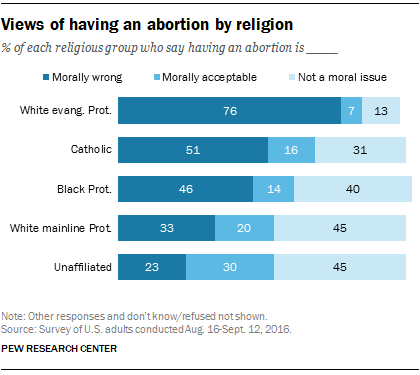Religion
Related: About this forumOpinion: Religion has no place in the legislative process, policy-making
http://www.oudaily.com/opinion/opinion-religion-has-no-place-in-the-legislative-process-policy/article_1ab27834-18b7-11e7-9fda-3710c1309020.htmlFaught’s statement was in defense of HB 1549, a bill he authored, which would make it illegal for women to have abortions if the procedure were solely because of Down syndrome or other genetic abnormalities.
...
While his statement, “God can bring beauty out of ashes,” garnered national coverage, the debate included plenty more faith-related defenses for the bill. However, in this case, the concern isn’t necessarily about anti-abortion versus pro-abortion rights. It’s about Faught’s continued arguments based on his religion, reflecting one of America’s most consistent problems.
Legal arguments should not be considered valid if the objection pertains only to religion. It should be an ethical obligation of those representing us in any capacity, whether it be local or national, to put aside their personal beliefs about religion. Separation of church and state is something a lot of us remember learning about in our most basic U.S. history courses from elementary school to college. Many people know of the concept, but it often gets pushed under the rug in real-world cases.
True Dough
(17,303 posts)Mike Pence would not, obviously. Hopefully he's not 46!
guillaumeb
(42,641 posts)What an interesting opinion.
So if I claim to be anti-abortion because of a sincerely held moral objection, would that ethical objection be permitted?
trotsky
(49,533 posts)The whole thing.
guillaumeb
(42,641 posts)The author is against having a religious basis for a political position. So if a non-theist advances a secular reason for opposing something that is acceptable. And that is the entirety of the argument. But theists and non-theists can arrive at identical positions on any particular issue, as my post about anti-abortion non-theists shows. The bottom line is that many people base their positions on their ethical positions.
trotsky
(49,533 posts)The author is most decidedly NOT against having a religious basis for one's political position.
Let me try and put it another way for you. Here's a quote from a famous politician that echoes the same sentiment. Read it and let me know if you understand the distinction being made.
Now this is going to be difficult for some who believe in the inerrancy of the Bible, as many evangelicals do. But in a pluralistic democracy, we have no choice. Politics depends on our ability to persuade each other of common aims based on a common reality. It involves the compromise, the art of what's possible. At some fundamental level, religion does not allow for compromise. It's the art of the impossible. If God has spoken, then followers are expected to live up to God's edicts, regardless of the consequences. To base one's life on such uncompromising commitments may be sublime, but to base our policy making on such commitments would be a dangerous thing.
guillaumeb
(42,641 posts)And what are these universal values? Are they changeable, subject to whoever is in power?
trotsky
(49,533 posts)I'm sorry you are struggling. If you paste that text into Google, you can find out who said it, and perhaps you could contact that politician for further clarification. As I understand it, he's not quite as busy as he used to be.
guillaumeb
(42,641 posts)trotsky
(49,533 posts)Lordquinton
(7,886 posts)that should answer your question. Well, rebut your statement.
Eko
(7,281 posts)but yes, morality is not a condition of religion. Atheists, Agnostics and theists all have morality not to mention that there is no standard morality among religions.

beam me up scottie
(57,349 posts)Especially this last part:
I don't think any liberal could possibly disagree with that. Haven't we all seen how religious bigotry leads to legalizing discrimination in this country?
We are a secular nation, our legislative process should reflect that.